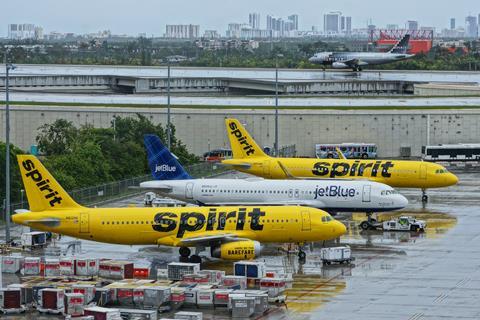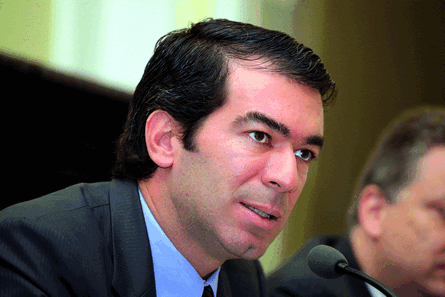A US district court ruled on 16 January that JetBlue Airways’ proposed $3.8 billion acquisition of rival low-cost carrier Spirit Airlines cannot proceed, blocking the deal on anti-competitive grounds.
The US District Court for the District of Massachusetts sided with the federal government’s argument that the proposed deal would violate the Clayton Act, an antitrust law designed to protect consumers from the harms of monopolies.
”The court rules that the proposed merger, as it stands, would substantially lessen competition in violation of the Clayton Act,” writes Boston-based US District Judge William Young. ”The proposed merger, therefore, is enjoined.”

The decision is a major setback for JetBlue’s growth strategy and ends the carrier’s all-out pursuit of Spirit’s assets – namely, its fleet of narrowbody Airbus jets. The carrier has described the deal as critical to its ambitions of competing with major US airlines.
JetBlue and Spirit disagree with the ruling and say they are evaluating next steps, seemingly leaving open the possibility of an appeal.
”We continue to believe that our combination is the best opportunity to increase much needed competition and choice by bringing low fares and great service to more customers in more markets while enhancing our ability to compete with the dominant US carriers,” the carriers say.
Last year, the so-called “Northeast Alliance” collaboration with American Airlines – focused on routes from major airports in the Northeast USA – was also deemed illegal, and therefore also had to be unwound. While American appealed that separate ruling, JetBlue did not, hoping it would help its bid for Spirit.
”JetBlue’s termination of the Northeast Alliance and commitment to significant divestitures have removed any reasonable anti-competitive concerns that the Department of Justice raised,” JetBlue adds.
The ruling has potential implications for the broader US airline industry – including Alaska Airlines’ pursuit of Hawaiian Airlines – which is constrained by pilot shortages and a lack of available aircraft. Young concedes that “it is understandable that JetBlue seeks inorganic growth through acquisition of aircraft that would eliminate one of its primary competitors”, but asserts that the deal “does violence to the core principle of antitrust law”.
”If JetBlue were permitted to gobble up Spirit – at least as proposed – it would eliminate one of the airline industry’s few primary competitors that provides unique innovation and price discipline,” he writes. “It would further consolidate an oligopoly by immediately doubling JetBlue’s stakeholder size in the industry.”
“Worse yet, the merger would likely incentivise JetBlue further to abandon its roots as a maverick, low-cost carrier.”
Young acknowledges that the combined company would likely put greater pressure on the “Big Four” US carriers – American Airlines, Delta Air Lines, Southwest Airlines and United Airlines.
”At the same time, however, the consumers that rely on Spirit’s unique, low-cost model would likely be harmed,” he writes. “The defendant airlines currently compete head-to-head throughout the country, and that competition, particularly Spirit’s downward pressure on prices, benefits all consumers.”
He argues that Spirit’s position in the market ”would be exceedingly difficult for another airline, or a combination of other airlines, to replicate, even with low barriers to entry and the dynamic nature of the industry inasmuch as they face the same industry-wide aircraft sourcing issues”.
The court’s decision comes just a week after longtime chief executive Robin Hayes announced that he is stepping down, to be succeeded by JetBlue’s president and chief operating officer Joanna Geraghty.


























